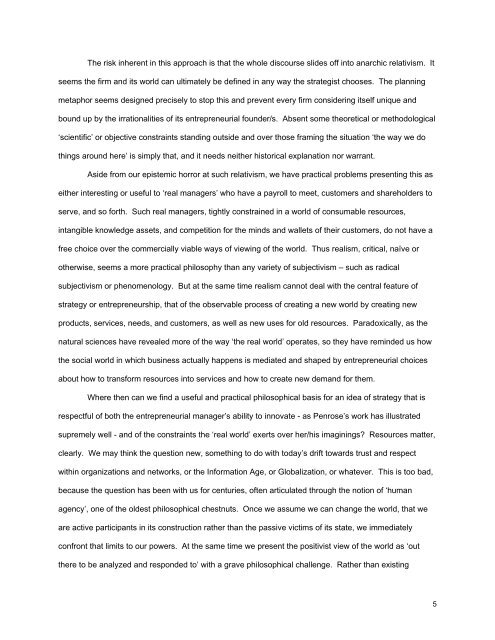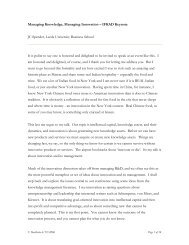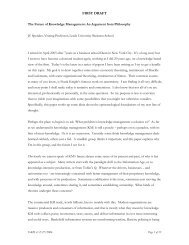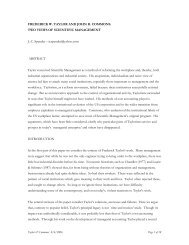PHILOSOPHY OF SCIENCE AND STRATEGY - JC Spender
PHILOSOPHY OF SCIENCE AND STRATEGY - JC Spender
PHILOSOPHY OF SCIENCE AND STRATEGY - JC Spender
Create successful ePaper yourself
Turn your PDF publications into a flip-book with our unique Google optimized e-Paper software.
The risk inherent in this approach is that the whole discourse slides off into anarchic relativism. It<br />
seems the firm and its world can ultimately be defined in any way the strategist chooses. The planning<br />
metaphor seems designed precisely to stop this and prevent every firm considering itself unique and<br />
bound up by the irrationalities of its entrepreneurial founder/s. Absent some theoretical or methodological<br />
‘scientific’ or objective constraints standing outside and over those framing the situation ‘the way we do<br />
things around here’ is simply that, and it needs neither historical explanation nor warrant.<br />
Aside from our epistemic horror at such relativism, we have practical problems presenting this as<br />
either interesting or useful to ‘real managers’ who have a payroll to meet, customers and shareholders to<br />
serve, and so forth. Such real managers, tightly constrained in a world of consumable resources,<br />
intangible knowledge assets, and competition for the minds and wallets of their customers, do not have a<br />
free choice over the commercially viable ways of viewing of the world. Thus realism, critical, naïve or<br />
otherwise, seems a more practical philosophy than any variety of subjectivism – such as radical<br />
subjectivism or phenomenology. But at the same time realism cannot deal with the central feature of<br />
strategy or entrepreneurship, that of the observable process of creating a new world by creating new<br />
products, services, needs, and customers, as well as new uses for old resources. Paradoxically, as the<br />
natural sciences have revealed more of the way ‘the real world’ operates, so they have reminded us how<br />
the social world in which business actually happens is mediated and shaped by entrepreneurial choices<br />
about how to transform resources into services and how to create new demand for them.<br />
Where then can we find a useful and practical philosophical basis for an idea of strategy that is<br />
respectful of both the entrepreneurial manager’s ability to innovate - as Penrose’s work has illustrated<br />
supremely well - and of the constraints the ‘real world’ exerts over her/his imaginings? Resources matter,<br />
clearly. We may think the question new, something to do with today’s drift towards trust and respect<br />
within organizations and networks, or the Information Age, or Globalization, or whatever. This is too bad,<br />
because the question has been with us for centuries, often articulated through the notion of ‘human<br />
agency’, one of the oldest philosophical chestnuts. Once we assume we can change the world, that we<br />
are active participants in its construction rather than the passive victims of its state, we immediately<br />
confront that limits to our powers. At the same time we present the positivist view of the world as ‘out<br />
there to be analyzed and responded to’ with a grave philosophical challenge. Rather than existing<br />
5





